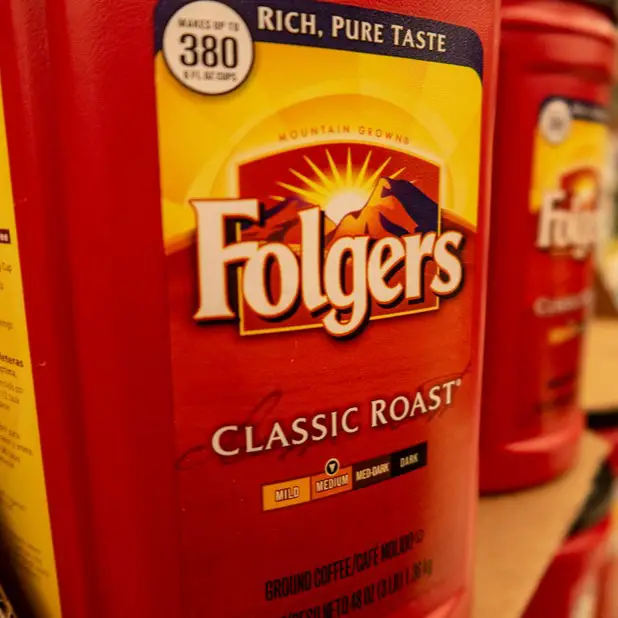Coffee lovers, brace yourselves. That familiar brand you’ve been loyally sipping for years might not be as great as you think. In fact, some of the most popular coffee brands out there have been called out for questionable practices, subpar quality, and a distinct lack of flavor. It’s time to take a closer look at the coffee brands you should be avoiding at all costs.
1. Folgers
Folgers, once a household name synonymous with morning coffee, has fallen from grace. The brand has been criticized for using shortcuts in quality and ethics for their products, raising concerns about freshness and overall taste. Folgers has also rejected common certifications that ensure sustainability and ethical working conditions, which is a major red flag.
Moreover, Folgers coffee is often pre-ground, which can compromise the freshness and flavor of the beans. The brand also lacks organic varieties, suggesting the use of pesticides, herbicides, and fungicides in their coffee production. With so many strikes against it, it’s no wonder Folgers tops the list of coffee brands to avoid.
If you’re looking for a better alternative, consider switching to a brand that prioritizes sustainability, ethical sourcing, and freshness. Opt for whole bean coffee that you can grind yourself for maximum flavor and aroma.
2. Maxwell House
Another household name that fails to deliver on quality and ethics is Maxwell House. Like Folgers, Maxwell House has rejected sustainability certifications and does not offer organic varieties, which is concerning for both the environment and the health-conscious consumer.
The brand’s coffee is also predominantly pre-ground, which means you’re not getting the freshest possible brew. Maxwell House is owned by a large conglomerate that doesn’t seem to prioritize ethical and environmentally-friendly practices, making it a brand to avoid if you want to support responsible coffee production.
Instead of settling for Maxwell House, try exploring local coffee roasters or specialty brands that focus on high-quality, ethically-sourced beans. You might be surprised by the difference in flavor and the peace of mind that comes with supporting a more sustainable brand.
3. Nescafé
Instant coffee giant Nescafé may be convenient, but it falls short in terms of quality and sustainability. While the brand has partnered with organizations like the Rainforest Alliance, it still does not offer organic certified coffees. This means that the coffee may contain harmful chemicals and pesticides.
Furthermore, instant coffee like Nescafé often lacks the depth of flavor and aroma found in freshly brewed coffee. The processing required to make instant coffee can strip away some of the bean’s natural oils and flavors, resulting in a less satisfying cup.
If you’re looking for convenience without sacrificing quality, consider investing in a good coffee maker or French press. This allows you to enjoy fresh, flavorful coffee without resorting to instant brands like Nescafé.
4. Dunkin’ Donuts
While Dunkin’ Donuts coffee might be a go-to for many, it’s worth reconsidering your loyalty. Although some of their coffee is Rainforest Alliance certified, the rest may contain harmful chemicals and molds. This inconsistency in quality is a cause for concern.
Moreover, Dunkin’ Donuts coffee is often over-roasted, resulting in a bitter, burnt taste that can overpower the bean’s natural flavors. The brand’s focus on speed and convenience may come at the cost of quality and freshness.
If you’re a die-hard Dunkin’ fan, consider trying out some local coffee shops or exploring other specialty brands. You might find a new favorite that offers better quality and flavor without the questionable practices.
5. Café Bustelo
Café Bustelo, known for its strong, bold flavor, might not be the best choice for the discerning coffee drinker. The brand is owned by the same company as Folgers, which has been criticized for its lack of sustainability and quality. Like its parent company, Café Bustelo also lacks important certifications that ensure ethical and environmentally-friendly practices.
While Café Bustelo’s distinctive taste might be appealing to some, it’s worth considering the potential drawbacks. The coffee is often pre-ground and may contain lower-quality beans, resulting in a less nuanced flavor profile.
If you enjoy bold, flavorful coffee, try exploring single-origin beans from reputable roasters. These coffees often have unique flavor profiles that can satisfy your craving for a strong brew without compromising on quality or ethics.
6. Seattle’s Best
Don’t let the name fool you – Seattle’s Best might not live up to its moniker. Owned by Starbucks, Seattle’s Best has been described as the coffee giant’s “dirty little secret,” as it doesn’t adhere to the same quality standards as the main Starbucks brand.
Seattle’s Best coffee is often pre-ground and may contain lower-quality beans, resulting in a less satisfying cup. The brand also lacks transparency about its sourcing and roasting practices, which can be a red flag for those who value sustainability and ethical production.
7. Chock Full o’ Nuts
Despite its charming, old-fashioned brand image, Chock Full o’ Nuts coffee fails to impress in terms of quality and flavor. The brand has been criticized for its poor taste, burnt, and bitter flavor profile, which can be a major turnoff for coffee lovers.
Chock Full o’ Nuts also lacks transparency about its sourcing and roasting practices, making it difficult to determine the coffee’s quality and sustainability. The brand’s pre-ground coffee may also compromise freshness and flavor.
When it comes to choosing a coffee brand, it’s important to consider factors like sustainability, ethical sourcing, and overall quality. By avoiding these seven brands and opting for more reputable alternatives, you can ensure that your daily cup of joe is not only delicious but also supports responsible and environmentally-friendly practices. So go ahead, break up with your old coffee flame, and embrace the new! There’s a whole world of amazing coffee just waiting to be discovered.

